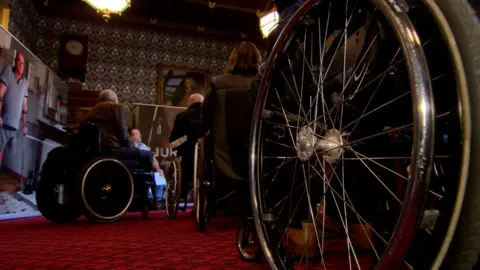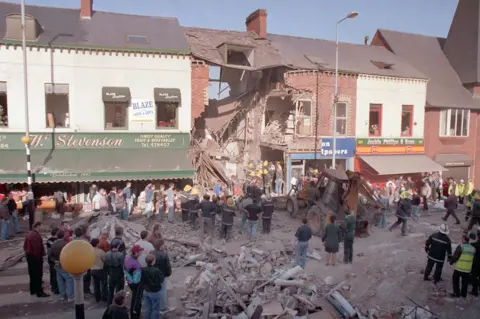Troubles victims' pensions: New board to decide who qualifies
 BBC
BBCA judge-led board will decide who will qualify for a new government payment scheme for people who were injured during the Troubles.
Northern Ireland Secretary Julian Smith has signed legislation to establish a payments scheme for people injured "through no fault of their own".
DUP leader Arlene Foster welcomed that stipulation, saying the money "will not be awarded to victim makers".
But Sinn Féin's Chris Hazzard said the rule created a "hierarchy of victims".
The campaign group Relatives for Justice agreed and accused the government of using the scheme to promote its "own partial narrative of the past".
The payment scheme follows years of debate and controversy about the best way to support people who were badly wounded during more than 30 years of violence in Northern Ireland.
Often referred to as the Troubles pension, victims' groups have long argued that those left with life-changing injuries needed and deserved ongoing financial support from the state.
But many critics were concerned that former paramilitaries, including those injured by bombs they had planted, could be eligible for payments.
The Troubles claimed more than 3,500 lives and the Northern Ireland Office has estimated that another 40,000 people were injured.
On Friday, Mr Smith signed regulations into law that will see the most severely injured survivors receiving payments ranging from about £2,000 to £10,000.
The pension-like payments will be paid to victims every year for the rest of their lives.
"The Troubles had a devastating impact on many and the time has come to implement a victims' payments scheme to deliver for those who need it most and for those injured through no fault of their own," Mr Smith said.
"We have talked about this for long enough. It is time to get it done."
However, the "no fault of their own" criteria has been criticised by campaigners who believe it is an attempt to circumvent the definition of a victim contained in the 2006 Victims and Survivors Order.
That definition identified a victim or survivor as someone who has been "physically or psychologically injured as a result of or in consequence of a conflict-related incident" but it made no reference to an individual's culpability.
Relatives for Justice said the government was running a "coach and horses through the 2006 order's definition of victims, a definition which has served our divided society well to date".
Sinn Féin MP Chris Hazzard described it as an act of "extreme bad faith" by the government and complained that the media had been briefed about the plan before victims' groups and elected representatives.
"These groups, these families have been on a long journey... towards the human rights-based system that was going to be in place," he said.
"That's been jettisoned now by [the] British government."
The South Down MP accused the government of "creating a primacy for their narrative of the conflict".
 Pacemaker
PacemakerThe legislation has been welcomed by others, including Mrs Foster, Northern Ireland's first minister.
"This is a massive and welcome step forward for the innocent victims of our Troubles," she said.
"It is particularly welcome that this pension will only be for those who were injured through no fault of their own."
'Mixed bag'
The Wave Trauma Centre, which helped to lead the campaign, also welcomed the legislation but said it wanted to examine the detail closely.
"No doubt there will be aspects that we and others would want done differently but for the first time the government has acknowledged the plight of the severely injured in a way that will make a real difference," said Wave's chief executive Sandra Peake.
Kenny Donaldson from Innocent Victims United said the regulations were a "mixed bag".
"We have a concern... around the geographical constraints because it is limited to UK citizens," said Mr Donaldson.
"People who would've been injured in the Republic of Ireland who are Irish citizens, they would not be included.
"We would reiterate today the absolute necessity for the Republic of Ireland to come up to the mark and match these resources to ensure no victim or survivor is disadvantaged - that's essential."
Unspent convictions
Applications will open by the end of May and the new Victims' Payments Board will have the power to exclude applicants with unspent convictions.
The money for the payments is expected to come out of the Northern Ireland block grant from Westminster.
Westminster sources point out that an extra £100m has been added to the sum intended for Troubles legacy matters, bringing it to £250m in total.
Troubles victims will be eligible to apply for a pension if they were injured in an incident at any point between 1 January 1966 and 12 April 2010, the date that responsibility for policing and justice was devolved to Stormont.
The scheme will also be open to those injured in incidents that took place outside Northern Ireland.
The pensions will be backdated to 2014 - the date when they were first agreed in principle by the Stormont parties under the Fresh Start Agreement.
Older victims over the age of 60 may opt to receive a lump sum rather than annual payments.
There will also be provisions to extend payments to those who care for Troubles victims for more than 35 hours a week.
In the event of a Troubles victim's death, there will be provisions to make a payment to their loved ones.
